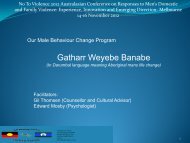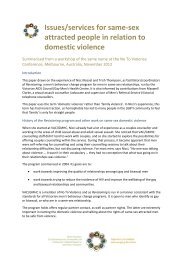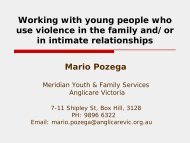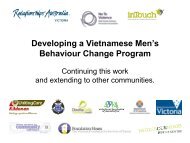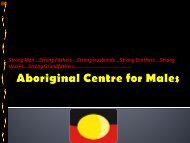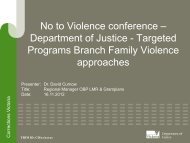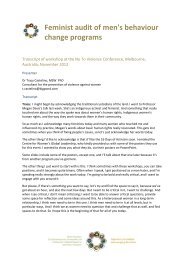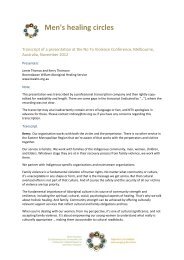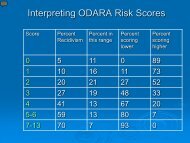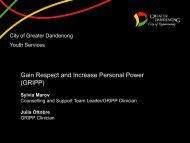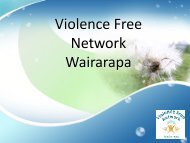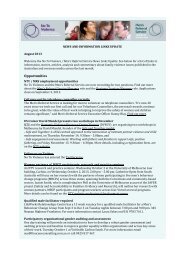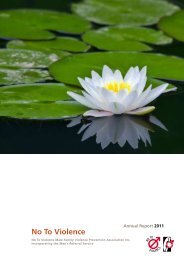Kia Rangatira te Mahi – work of the Chiefs
Kia Rangatira te Mahi â work of the Chiefs - No To Violence
Kia Rangatira te Mahi â work of the Chiefs - No To Violence
You also want an ePaper? Increase the reach of your titles
YUMPU automatically turns print PDFs into web optimized ePapers that Google loves.
<strong>Kia</strong> <strong>Rangatira</strong> <strong>te</strong> <strong>Mahi</strong> <strong>–</strong> <strong>work</strong> <strong>of</strong><br />
<strong>the</strong> <strong>Chiefs</strong><br />
Transcript <strong>of</strong> a presentation at <strong>the</strong> No To Violence Conference, Melbourne,<br />
Australia, November 2012<br />
Presen<strong>te</strong>rs<br />
Roni Albert and Ariana Simpson<br />
Te Whakaruruhau Maori Women's Refuge<br />
Darrin Haimona<br />
Te Hauora a Ngati Houa<br />
No<strong>te</strong><br />
This presentation was transcribed by a pr<strong>of</strong>essional transcription company and <strong>the</strong>n lightly copyedi<strong>te</strong>d<br />
for readability and length. There are some gaps in <strong>the</strong> transcript (indica<strong>te</strong>d by "…"), where <strong>the</strong><br />
recording was not clear.<br />
The transcript may also inadver<strong>te</strong>ntly contain errors <strong>of</strong> language or fact, and NTV apologises in<br />
advance for <strong>the</strong>se. Please contact rodney@ntv.org.au if you have any concerns regarding this<br />
transcription.<br />
Transcript<br />
Roni: I feel very honoured and privileged to be here. I acknowledge <strong>the</strong> ancestors <strong>of</strong> this land, and<br />
feel honoured and privileged to have <strong>the</strong> opportunity to present about our service. It’s unique.<br />
We’ve exis<strong>te</strong>d in Hamilton and <strong>the</strong> area <strong>of</strong> Hamilton-Waikato for <strong>the</strong> past 26 years. We were formed<br />
in 1986, and we were <strong>the</strong> first Maori Women’s Refuge under <strong>the</strong> umbrella <strong>of</strong> our National Collective<br />
<strong>of</strong> Independent Women’s Refuges. At that time <strong>the</strong>re were about 54 refuges.<br />
So we were really lucky. Our guidelines were taken from <strong>the</strong> general refuges that exis<strong>te</strong>d. However,<br />
we took our organisation into <strong>the</strong> area <strong>of</strong> marae and how we take care <strong>of</strong> <strong>the</strong> people. That’s been<br />
part <strong>of</strong> our guidance.<br />
There have been many changes over <strong>the</strong> years but our main focus was on <strong>work</strong>ing with women and<br />
children. But <strong>the</strong>re were only a few <strong>of</strong> us, a small band <strong>of</strong> women, and a really humble little safe<br />
house <strong>of</strong> about four bedrooms. At <strong>the</strong> time we were dealing with about 60 cases per month. And<br />
Hamilton is an area <strong>of</strong> about 25<strong>–</strong>30,000 people, but we got families from all over <strong>the</strong> place. Our<br />
service was unique because we took <strong>the</strong> guidance from our families. That meant that <strong>of</strong><strong>te</strong>n we were<br />
up against sys<strong>te</strong>ms, we were up against community, we were up against families. Wha<strong>te</strong>ver <strong>the</strong><br />
families needed, we helped and <strong>work</strong>ed towards providing it.<br />
My reason for <strong>work</strong>ing in a refuge was very much about <strong>the</strong> pro<strong>te</strong>ction <strong>of</strong> people and my fight<br />
against <strong>the</strong> injustices that people sustained. I guess a lot s<strong>te</strong>mmed from my own upbringing. I was<br />
raised by a pakeha family from <strong>the</strong> age <strong>of</strong> six weeks. And so I knew very little about my own<br />
background and where my mo<strong>the</strong>r came from. I learnt that on <strong>the</strong> way. I learnt that my mo<strong>the</strong>r had
had to let 10 <strong>of</strong> us go from <strong>the</strong> family as required by what was <strong>the</strong>n <strong>the</strong> Department <strong>of</strong> Social<br />
Welfare. We were all taken from her, and two <strong>of</strong> us were given back to her.<br />
And one <strong>of</strong> <strong>the</strong> things that my pakeha mo<strong>the</strong>r had said to me was that <strong>the</strong> social <strong>work</strong>ers told her<br />
that to get us back she would need to do three things. She would need to marry a pakeha, she would<br />
need to stop drinking, and she’d need to get a house, stable for us. And I always remembered that<br />
because I had my own issues that I carried through my years. I guess in some ways it brought home<br />
to me a sense <strong>of</strong> great injustice and a feeling <strong>of</strong> pro<strong>te</strong>ctiveness.<br />
And so our <strong>work</strong> with <strong>the</strong> families <strong>of</strong><strong>te</strong>n involved gaining that support for <strong>the</strong> women and children’s<br />
needs <strong>–</strong> getting <strong>the</strong>m out <strong>of</strong> <strong>the</strong>ir homes, helping <strong>the</strong>m through <strong>the</strong> legal sys<strong>te</strong>ms, getting <strong>the</strong>m a<br />
house. So we needed to start <strong>work</strong>ing alongside our sys<strong>te</strong>ms or our ministries as a fas<strong>te</strong>r way <strong>of</strong><br />
getting access for those families.<br />
Then <strong>the</strong> women had an opportunity to decide whe<strong>the</strong>r <strong>the</strong>y needed to break from <strong>the</strong> violent<br />
relationship or whe<strong>the</strong>r <strong>the</strong>y wan<strong>te</strong>d to go back. What we discovered in <strong>the</strong> early days is that a big<br />
percentage <strong>of</strong> our women went back to <strong>the</strong>ir families, went back to <strong>the</strong>ir partner, or <strong>the</strong>ir men. And<br />
we weren’t sure about this. Again, it was only a guidance. Really, you can’t force someone to say,<br />
“You’re going to get killed if you go back. This is going to happen to your children”.<br />
We needed to make sure that we had sys<strong>te</strong>ms set up, and <strong>the</strong>n that <strong>the</strong> woman wan<strong>te</strong>d to come<br />
out. They wan<strong>te</strong>d to have a chance to decide, “What do I want to do for my future?” So we were<br />
shortcutting things. We had to make sure that <strong>the</strong> woman had financial assistance, that we set up a<br />
sys<strong>te</strong>m that was going to be immedia<strong>te</strong>, and that it would sustain her. We set up a process for<br />
housing. When <strong>the</strong> woman decides she wants to leave her home, close it down, and go into new<br />
housing, it needs to be done quickly.<br />
Some <strong>of</strong> <strong>the</strong>se things take around six to eight weeks, and <strong>of</strong><strong>te</strong>n we were held up by <strong>the</strong> sys<strong>te</strong>ms, as I<br />
guess you would know. We’re really no different to you. I can imagine that, without any put-down to<br />
<strong>the</strong> governments, both sides have <strong>the</strong>ir issues. The most reliable thing about our government is <strong>the</strong><br />
inconsis<strong>te</strong>ncies, and I know that that’s <strong>the</strong> case over here too. And we <strong>of</strong><strong>te</strong>n can’t go beyond <strong>the</strong>se<br />
difficulties; <strong>the</strong>y keep us in one place. The women can’t make that break from <strong>the</strong> family or look at a<br />
way to maintain <strong>the</strong>ir safety.<br />
So <strong>the</strong>se are some <strong>of</strong> <strong>the</strong> areas that we <strong>work</strong>ed on and built up over <strong>the</strong> years. It’s taken 26 years for<br />
our relationship with some <strong>of</strong> <strong>the</strong>se sys<strong>te</strong>ms to settle in. And because we’re such a small service, a<br />
small Maori service, we have so much to con<strong>te</strong>nd with <strong>–</strong> from racism, to hierarchy, to not being<br />
lis<strong>te</strong>ned to because we’re female. That’s what came through for us. So we had to find bet<strong>te</strong>r,<br />
sharper ways <strong>of</strong> being able to get what we wan<strong>te</strong>d.<br />
That opportunity came probably within <strong>the</strong> last six years. And we were gra<strong>te</strong>ful. We were funded for<br />
a time by one <strong>of</strong> <strong>the</strong> ministries, $1.2 million. And so we grew from a group <strong>of</strong> five women volun<strong>te</strong>ers<br />
to 30 people now, and we’re all paid.<br />
We’re trying to hold that toge<strong>the</strong>r, but what it did was it helped us develop some <strong>of</strong> <strong>the</strong> areas we<br />
wan<strong>te</strong>d to <strong>work</strong> with. We knew back <strong>the</strong>n that one <strong>of</strong> <strong>the</strong> key things we needed was to <strong>work</strong> with<br />
our men. Getting to our men first was <strong>the</strong> fas<strong>te</strong>st way to be able to <strong>work</strong> at pro<strong>te</strong>cting <strong>the</strong> women<br />
and children. And because our group was able to be bet<strong>te</strong>r resourced, we had <strong>the</strong> chance <strong>of</strong> being<br />
able to stretch that out and develop it.<br />
No To Violence 2012 Australian Conference on Responses to Men's Domestic and Family Violence<br />
www.ntvconference.org<br />
<strong>Kia</strong> <strong>Rangatira</strong> <strong>te</strong> <strong>Mahi</strong> <strong>–</strong> <strong>work</strong> <strong>of</strong> <strong>the</strong> <strong>Chiefs</strong> Page 2 <strong>of</strong> 12
Some <strong>of</strong> those contacts and supports that we had at that time was actually with <strong>the</strong> prison. We had<br />
Corrections, <strong>the</strong> Regional Manager from Corrections and Ministry <strong>of</strong> Social Development come and<br />
ask us whe<strong>the</strong>r we thought <strong>the</strong>re would be an opportunity for support from Corrections or <strong>work</strong>ing<br />
with <strong>the</strong> prisons. We thought not, because most <strong>of</strong> <strong>the</strong> time we’re trying to get our men in <strong>the</strong>re. In<br />
some extreme cases, our men need to calm down, and <strong>the</strong>y stay in prison for as long as we need<br />
<strong>the</strong>m to. And that <strong>of</strong><strong>te</strong>n doesn’t happen.<br />
It meant that we needed to get closer to some <strong>of</strong> <strong>the</strong> hierarchy, some <strong>of</strong> <strong>the</strong> people we needed to<br />
collabora<strong>te</strong> with in order to pro<strong>te</strong>ct <strong>the</strong> women fur<strong>the</strong>r. We needed justice when our women would<br />
go through <strong>the</strong> courts, and <strong>the</strong> courts would deal out lenient sen<strong>te</strong>nces, or something that was<br />
pretty horrific.<br />
So we would go and fight. And we always took direction from our women. Once we had five women<br />
in our house who didn’t want to do court counselling. Now, that was manda<strong>te</strong>d by <strong>the</strong> court. A<br />
Family Court had manda<strong>te</strong>d that <strong>the</strong>y needed to do counselling jointly with <strong>the</strong>ir partners. But <strong>the</strong>y<br />
were afraid <strong>of</strong> <strong>the</strong>ir partners. They’d just come in, it was really new, and it wasn’t safe. And so <strong>the</strong>y<br />
said, “What can we do, Roni?” I said, “Well, you could boycott it”. And so that’s what happened; we<br />
boycot<strong>te</strong>d it. We got into a bit <strong>of</strong> trouble, but we still boycot<strong>te</strong>d it. We are okay about going to <strong>the</strong><br />
extreme. From that time, we knew that any case that meant we wouldn’t be pro<strong>te</strong>c<strong>te</strong>d by <strong>the</strong><br />
sys<strong>te</strong>m, or we didn’t have help from those avenues, we needed to go beyond that.<br />
There are many different stories about what we did for pro<strong>te</strong>ction. Unfortuna<strong>te</strong>ly, some <strong>of</strong> <strong>the</strong> areas<br />
got us into trouble with <strong>the</strong> sys<strong>te</strong>ms, but as long as we had that guidance from <strong>the</strong> family and that<br />
support, <strong>the</strong>n we could take mat<strong>te</strong>rs into our own hands because our in<strong>te</strong>ntion was to pro<strong>te</strong>ct <strong>the</strong><br />
women and children.<br />
So sometimes we’d have to cut through some <strong>of</strong> those avenues <strong>of</strong> <strong>the</strong> law in order to pro<strong>te</strong>ct. That<br />
was our priority.<br />
As this relationship developed over <strong>the</strong> past six years, that’s probably been <strong>the</strong> most unique thing<br />
that’s happened. But we also have a <strong>work</strong> party <strong>of</strong> our men who have been long-<strong>te</strong>rm prisoners.<br />
We’re talking about five to 15 years that <strong>the</strong>y’ve been in prison. They’re usually <strong>the</strong> hard-core men<br />
who come out with <strong>the</strong> guard, and <strong>the</strong>y do <strong>work</strong>.<br />
Mainly <strong>the</strong>y’ve been doing <strong>work</strong> on <strong>the</strong> outskirts <strong>of</strong> <strong>the</strong> cities. We’re probably <strong>the</strong> first organisation<br />
that <strong>the</strong>y’ve <strong>work</strong>ed for in <strong>the</strong> city. They come out and do <strong>the</strong> main<strong>te</strong>nance for our houses. We’re<br />
<strong>the</strong>re to build trust. A lot <strong>of</strong> <strong>the</strong> men mainly know us as home-breakers, a bunch <strong>of</strong> lesbians. You<br />
know, <strong>the</strong>y, “took our families away”. Well that’s not what we do. And I guess ins<strong>te</strong>ad <strong>of</strong> talking to<br />
that, we <strong>work</strong>ed alongside <strong>the</strong> men. So <strong>the</strong>y actually <strong>work</strong>ed on our women’s houses, <strong>the</strong>y repaired<br />
<strong>the</strong> damage in <strong>the</strong> houses.<br />
So that was some <strong>of</strong> our <strong>work</strong>. Because we were voluntary, we used to call our families or anyone<br />
else we could snap up to help us to move and pack up and get those families to safety. Now we <strong>work</strong><br />
alongside <strong>the</strong> prison, with our men. And <strong>the</strong> impact <strong>of</strong> that has been immense <strong>–</strong> immense on <strong>the</strong><br />
men, but also immense on us. For us, we needed to change <strong>the</strong> judgement that we had. Personally, I<br />
needed to change judgement because I expec<strong>te</strong>d that when you’re violent and you continue to go<br />
in, <strong>the</strong>re is no way that you’re likely to make a change, and that it would take in<strong>te</strong>nse <strong>work</strong> to do<br />
that. But that needed to be put aside, no mat<strong>te</strong>r what anyone had done. And we did put that aside,<br />
or I did put that aside. And <strong>the</strong> benefits have been great for our women, for our service, and also for<br />
<strong>the</strong> men.<br />
No To Violence 2012 Australian Conference on Responses to Men's Domestic and Family Violence<br />
www.ntvconference.org<br />
<strong>Kia</strong> <strong>Rangatira</strong> <strong>te</strong> <strong>Mahi</strong> <strong>–</strong> <strong>work</strong> <strong>of</strong> <strong>the</strong> <strong>Chiefs</strong> Page 3 <strong>of</strong> 12
In one <strong>of</strong> <strong>the</strong> first houses we placed <strong>the</strong>m in, we said to <strong>the</strong> guard, “We need this house shut down<br />
within three hours”. The men went in, <strong>the</strong> damage was huge. There was blood spat<strong>te</strong>red all over <strong>the</strong><br />
place, <strong>the</strong>re were kids’ pla<strong>te</strong>s, and so on. And <strong>the</strong> men didn’t speak; <strong>the</strong>y cleaned and patched up<br />
<strong>the</strong> house within two days. And <strong>the</strong>y came back to speak to our staff. And we didn’t know why <strong>the</strong>y<br />
were coming back, but <strong>the</strong>y did it to acknowledge what had happened and what <strong>the</strong>y had seen, and<br />
that <strong>the</strong>y recognised how <strong>the</strong>y’d been a part <strong>of</strong> it. They acknowledged how <strong>the</strong>y had left <strong>the</strong>ir own<br />
partners, and how some <strong>of</strong> <strong>the</strong>m had grown in <strong>the</strong>ir own families, but had never had a chance to<br />
give back.<br />
So it’s become a giving-back for us. It’s unusual, and we’re getting a lot <strong>of</strong> odd looks and queries<br />
because we’re a women’s refuge and we’re <strong>work</strong>ing alongside our men. We <strong>work</strong> closely with <strong>the</strong>m.<br />
That’s been <strong>the</strong> best relationship for us, as I said. And one <strong>of</strong> <strong>the</strong> things that stands out for me<br />
<strong>work</strong>ing alongside <strong>the</strong>m so <strong>the</strong>y don’t harm again <strong>–</strong> is where this development will go. They really<br />
recognise, “The decision that you made to get yourself in <strong>the</strong>re, we don’t want you doing that on our<br />
show”.<br />
So <strong>the</strong>re’s a lot <strong>of</strong> dialogue between us about what <strong>the</strong> men have permit<strong>te</strong>d. We’ve talked about <strong>the</strong><br />
amendment and <strong>the</strong>y want to know how to amend. My discussions <strong>of</strong><strong>te</strong>n with <strong>the</strong> men are that,<br />
“You can't amend with <strong>the</strong> victim. You can amend in ano<strong>the</strong>r way within <strong>the</strong> community, or with<br />
yourself”. The priority is, you get yourself right. Because you may never have <strong>the</strong> opportunity to be<br />
able to speak to <strong>the</strong>m.<br />
Sometimes it’s taken a lot out <strong>of</strong> me, when you hear about <strong>the</strong> rapes, or about <strong>the</strong> gang-rape <strong>of</strong> a<br />
15-year-old. One <strong>of</strong> <strong>the</strong> men came and hid with <strong>the</strong>m … I knew <strong>the</strong>re was something that he wan<strong>te</strong>d<br />
to say … For him, his daugh<strong>te</strong>r was 18. He had gang-raped a young girl at 15. And he said, “I wasn’t<br />
meant to, but I’ve never … ” He’s never forgiven himself. Even in <strong>the</strong> 15 years he spent in gaol, he<br />
had not forgiven himself. And my heart just went out to him and I wan<strong>te</strong>d to <strong>work</strong> alongside him,<br />
because for me, <strong>the</strong> most important thing again is <strong>the</strong> pro<strong>te</strong>ction <strong>of</strong> our women and children, our<br />
community, and our men.<br />
It feels like I’ve done a turnaround where I’m pro<strong>te</strong>cting our men. I am sure <strong>the</strong>y have a lot to learn<br />
from men who come from prison. And taking <strong>the</strong>m out into our community, people don’t trust<br />
<strong>the</strong>m. You know, you have killed, you have maimed, you have injured, you have harmed; and that’s<br />
<strong>of</strong><strong>te</strong>n what people see. But when <strong>the</strong>y see Refuge <strong>work</strong>ing alongside <strong>the</strong>m, that’s a different story. It<br />
means that we need to come up and say, “It’s all right. We’ve got this one covered”. We know it's a<br />
trusting and a building for us, because we want to elimina<strong>te</strong> that.<br />
Darrin: [Maori speech.] Greetings. My name is Darrin. I’m just giving thanks for <strong>the</strong> sacred lands that<br />
we are <strong>work</strong>ing on at <strong>the</strong> moment, and also <strong>the</strong> ancestors who are here with us.<br />
The words <strong>Kia</strong> rangatira <strong>te</strong> mahi are really about creating leaders or rangatira. But in some<br />
instances, we use <strong>the</strong> <strong>te</strong>rm to define what is best practice. <strong>Kia</strong> rangatira, how we become best at<br />
what we do. How do we make our <strong>work</strong> best practice?<br />
We used Maori <strong>te</strong>rms specifically to define what that is. So if you’re trying to figure out where we’re<br />
leading to, it is actually about what makes best practice. And initially it was about what makes best<br />
practice <strong>work</strong>ing with <strong>the</strong> men, and how we develop a best practice model. We searched<br />
everywhere. Twenty-something years ago, we star<strong>te</strong>d in New Zealand to implement what was <strong>the</strong>n<br />
<strong>the</strong> Duluth Model <strong>of</strong> <strong>work</strong>ing with domestic violence and sys<strong>te</strong>mic responses. Alongside Roni and <strong>the</strong><br />
refuges, we were part <strong>of</strong> <strong>the</strong> sys<strong>te</strong>mic responses in developing <strong>the</strong>m.<br />
No To Violence 2012 Australian Conference on Responses to Men's Domestic and Family Violence<br />
www.ntvconference.org<br />
<strong>Kia</strong> <strong>Rangatira</strong> <strong>te</strong> <strong>Mahi</strong> <strong>–</strong> <strong>work</strong> <strong>of</strong> <strong>the</strong> <strong>Chiefs</strong> Page 4 <strong>of</strong> 12
As Maori people, we were part <strong>of</strong> a mandatory arrest process. So we were part and parcel <strong>of</strong> <strong>the</strong><br />
police response, which is now about our in<strong>te</strong>gra<strong>te</strong>d sys<strong>te</strong>m, courts etc. I would say that Roni and Ari<br />
were fronting a lot <strong>of</strong> that <strong>work</strong> at <strong>the</strong> time as Maori women, and being challenged by our own<br />
Maori people about how we could participa<strong>te</strong> in <strong>the</strong> sys<strong>te</strong>m that continued to arrest our people and<br />
put <strong>the</strong>m into incarceration. And <strong>the</strong> response <strong>of</strong> our women at that time, was, how could we as<br />
Maori people continue to condone and ignore and compromise <strong>the</strong> violence that was happening to<br />
our Maori women and children?<br />
We were constantly locked in this deba<strong>te</strong>. In New Zealand Maori men are four times more likely<br />
than any race <strong>of</strong> men in our country to be arres<strong>te</strong>d for domestic violence. We’re four times more<br />
likely. That doesn’t say <strong>the</strong>re are four times more cases that we’re involved in, because we’re<br />
actually only 12% <strong>of</strong> <strong>the</strong> population. We’re four times more likely to be arres<strong>te</strong>d because we’re<br />
Maori. And we’re two times more likely to be convic<strong>te</strong>d because we’re Maori.<br />
So we’re not just dealing with issues <strong>of</strong> domestic violence in New Zealand; we’re dealing also with<br />
issues <strong>of</strong> racism, sexism, poverty, classism, you name it. So when we talk about best practice here,<br />
we cannot address domestic violence by looking only at <strong>the</strong> individual violence that a man<br />
perpetra<strong>te</strong>s within his family. It has to be seen in connection.<br />
So when Roni talks about <strong>work</strong>ing with <strong>the</strong>se men from prison, <strong>the</strong>re’s <strong>the</strong> instinct to say, “Sorry, he<br />
raped my daugh<strong>te</strong>r. I don’t want to know about him”. And so <strong>the</strong> responsibility around that sits<br />
inside <strong>the</strong>re. But what she’s trying to say, and I think that we all recognise it af<strong>te</strong>r a while, is that<br />
we’re all part <strong>of</strong> a community response. In my case, eventually I might have to <strong>work</strong> with my own<br />
uncles, my own bro<strong>the</strong>rs, my own family members.<br />
Roni is saying that as a tribal group <strong>of</strong> people, we now see <strong>the</strong>se perpetrators and abusers, and we<br />
always have, as not only being perpetrators towards our mo<strong>the</strong>rs, our daugh<strong>te</strong>rs, and our sis<strong>te</strong>rs,<br />
but <strong>the</strong>y are our bro<strong>the</strong>rs, our fa<strong>the</strong>rs, our nephews, and possibly our grandchildren. So <strong>the</strong><br />
responsibility for us to support change is even grea<strong>te</strong>r. We cannot just say, “Incarcera<strong>te</strong>, incarcera<strong>te</strong><br />
<strong>the</strong>re”. Because actually, change has to come from us being part <strong>of</strong> both <strong>the</strong> problem and <strong>the</strong><br />
solution. I wish we could just be <strong>the</strong> solution, but actually we’re part <strong>of</strong> <strong>the</strong> problem as well.<br />
In New Zealand, Maori women are four times more likely than any race <strong>of</strong> women in New Zealand to<br />
be physically and sexually abused. Four times more than any race in our own land and country.<br />
Maori women aged between 15 and 27 years <strong>of</strong> age are seven times more likely to be hospitalised<br />
than any race <strong>of</strong> women in New Zealand.<br />
Now, that doesn’t mean to say that <strong>the</strong> abusers or perpetrators are all Maori because actually<br />
<strong>the</strong>y’re not. They’re whi<strong>te</strong> men as well as o<strong>the</strong>r races <strong>of</strong> men. Australians as well who have married<br />
and participa<strong>te</strong>d with our women. But it seems to be that in our country, it is okay for that level <strong>of</strong><br />
violence to occur.<br />
So a number <strong>of</strong> years ago, we star<strong>te</strong>d to establish this movement. From <strong>work</strong>ing solely for <strong>the</strong><br />
pro<strong>te</strong>ction <strong>of</strong> women, Roni has now moved onto <strong>the</strong> belief, “I can’t crea<strong>te</strong> <strong>the</strong> change that needs to<br />
happen if I just stay here <strong>work</strong>ing in this space with our women. Because I can’t continue to pro<strong>te</strong>ct<br />
<strong>the</strong>m unless our Maori men and <strong>the</strong> rest <strong>of</strong> society participa<strong>te</strong> in taking responsibility around <strong>the</strong>m”.<br />
And I’m sure that you all agree with that.<br />
I’m introducing this idea into <strong>the</strong> <strong>the</strong>me. You see, in New Zealand, we’re part <strong>of</strong> a colonised group <strong>of</strong><br />
people who have had our lands and our language removed, just like our Aboriginal bro<strong>the</strong>rs and<br />
sis<strong>te</strong>rs here. Our language, our culture, you name it. We’re still bearing <strong>the</strong> effects <strong>of</strong> that. And so<br />
we’re survivors <strong>of</strong> all <strong>of</strong> this.<br />
No To Violence 2012 Australian Conference on Responses to Men's Domestic and Family Violence<br />
www.ntvconference.org<br />
<strong>Kia</strong> <strong>Rangatira</strong> <strong>te</strong> <strong>Mahi</strong> <strong>–</strong> <strong>work</strong> <strong>of</strong> <strong>the</strong> <strong>Chiefs</strong> Page 5 <strong>of</strong> 12
We wan<strong>te</strong>d to know why we’re so violent now. Was it an inna<strong>te</strong> part <strong>of</strong> our culture? Well, we<br />
checked it all out, and <strong>the</strong> earliest writings <strong>of</strong> <strong>the</strong> settlers who came to New Zealand spoke about<br />
<strong>the</strong>se Maori men who were <strong>the</strong> primary caregivers <strong>of</strong> <strong>the</strong>ir children. It wasn’t <strong>the</strong> women. There are<br />
even writings in New Zealand that talk about Maori men treating <strong>the</strong>ir women as companions and<br />
partners. In fact, a common sta<strong>te</strong>ment was that <strong>the</strong> status <strong>of</strong> Maori women was <strong>the</strong> envy <strong>of</strong><br />
European women.<br />
So I sat <strong>the</strong>re and said, “What happened?” This was in <strong>the</strong> 1700s up to <strong>the</strong> early 1800s <strong>–</strong> 1824 <strong>–</strong><br />
before we signed <strong>the</strong> Treaty. That’s only 200 years ago. What happened? I know we have a place in<br />
my community in Pirongia, where <strong>the</strong>y set up <strong>the</strong> first Mission schools and where <strong>the</strong>y taught our<br />
children English. And our people were so exci<strong>te</strong>d. “Good, we’re going to get an education.” They<br />
sent <strong>the</strong>ir children into <strong>the</strong>se schools. And <strong>the</strong> children came back, some bea<strong>te</strong>n with canes <strong>–</strong> a<br />
number because <strong>the</strong>y were speaking in Maori probably, but also that was <strong>the</strong> way that <strong>the</strong>y were<br />
taught.<br />
The people from our tribe were appalled by this. They had never experienced a child being hit and<br />
bea<strong>te</strong>n. So <strong>the</strong>y banned <strong>the</strong>ir children from going to school. They banned <strong>the</strong>m until <strong>the</strong> senior<br />
children were forced, <strong>of</strong> course, into <strong>the</strong>se schools.<br />
Today in New Zealand, our Maori children make up half <strong>of</strong> <strong>the</strong> cases <strong>of</strong> violent <strong>of</strong>fences in our<br />
country. And yet traditionally, we were appalled that anybody could even think about touching a<br />
child, because <strong>the</strong>y were considered to be sacred, tapu. Women were sanctified, tapu, sacred,<br />
because <strong>the</strong>y bore children. So what we have is a whole cultural change.<br />
What we recognise now is that <strong>the</strong> violence that we perpetua<strong>te</strong> today is part <strong>of</strong> <strong>the</strong> violence <strong>of</strong> our<br />
colonisation. It’s part and parcel <strong>of</strong> that. It’s my self-hatred. I’ve been all around <strong>the</strong> world, looking at<br />
family violence. Terms <strong>of</strong> violence include “You bitch”, “You slut”, “You whore”, and so on. But <strong>of</strong><br />
course you come into Indigenous cultures and you’re not just a bitch, a slut and a whore, you’re a<br />
black bitch, a black slut and a black whore.<br />
So you are ha<strong>te</strong>d not only because <strong>of</strong> your gender, but also because <strong>of</strong> your race. And <strong>the</strong> people<br />
who are saying <strong>the</strong>se things are sometimes <strong>the</strong> same colour as you. So it’s a self-hatred that we have<br />
and we perpetua<strong>te</strong> this hatred against our women and our children. And so <strong>the</strong>se are <strong>the</strong> levels <strong>of</strong><br />
violence.<br />
And when you talk about a holistic approach to violence, <strong>the</strong>n you’d bet<strong>te</strong>r get real, because we’ve<br />
got to deal with <strong>the</strong> past stuff as well. We’re not just talking about sys<strong>te</strong>ms’ responses, we’re talking<br />
about a whole history <strong>of</strong> occasions.<br />
Currently in New Zealand, <strong>the</strong> highest numbers perpetrating violence are actually our young Maori<br />
youth. So we are looking at this situation and doing <strong>work</strong> within our country and within our<br />
organisation as well. We have to make <strong>the</strong> changes from <strong>the</strong> inside.<br />
So we’re talking about a change around in<strong>te</strong>gration and using sys<strong>te</strong>ms from a traditional position to<br />
a con<strong>te</strong>mporary one. Now I’d like to introduce Ariana, who’s <strong>work</strong>ed with us in <strong>the</strong> past in relation to<br />
<strong>the</strong> Courts and so on. She’s going to give her impressions about where we’re sitting now.<br />
Ariana: Thank you. I’m from <strong>the</strong> Bay <strong>of</strong> Plenty and East Coast <strong>of</strong> <strong>the</strong> North Island. Te Whānau-ā-<br />
Apanui is my coastal tribe, and Ngāti Whaoa is <strong>the</strong> Bay <strong>of</strong> Plenty tribe that I came from.<br />
As Darrin was saying, all <strong>of</strong> us have histories <strong>of</strong> very strong, powerful women who were leaders <strong>of</strong><br />
<strong>the</strong>ir time. When I was at university, I did direc<strong>te</strong>d research on what we call puhi, who were<br />
No To Violence 2012 Australian Conference on Responses to Men's Domestic and Family Violence<br />
www.ntvconference.org<br />
<strong>Kia</strong> <strong>Rangatira</strong> <strong>te</strong> <strong>Mahi</strong> <strong>–</strong> <strong>work</strong> <strong>of</strong> <strong>the</strong> <strong>Chiefs</strong> Page 6 <strong>of</strong> 12
particular young women who were usually <strong>the</strong> daugh<strong>te</strong>rs <strong>of</strong> chiefs or significant females within <strong>the</strong><br />
tribe, and considered that by <strong>the</strong> tribe. I got most <strong>of</strong> my information from tribal narratives and<br />
songs. And <strong>the</strong>re was a heap <strong>of</strong> information <strong>the</strong>re. We went from a place <strong>of</strong> sanctuary, sanctity, <strong>of</strong><br />
specialness, to <strong>the</strong> place where we are today, which is qui<strong>te</strong> sad.<br />
And so we still have a lived memory, really. My grandmo<strong>the</strong>r died four years ago; she was 95. She<br />
was born in 1913 and she remembers <strong>the</strong> times when she was brought up on <strong>the</strong> East Coast, if a<br />
child or a woman was viola<strong>te</strong>d, she remembers <strong>the</strong> man was banished from that tribal area.<br />
So you weren’t an individual who could just run around and be unaccoun<strong>te</strong>d for. Banishment in<br />
those days meant that that message was carried right through to o<strong>the</strong>r tribal areas. Everybody, in<br />
fact, knew about what you had done, where you had come from, etc. So you just couldn’t en<strong>te</strong>r<br />
ano<strong>the</strong>r tribal area without being known.<br />
One <strong>of</strong> <strong>the</strong> things I learnt while <strong>work</strong>ing with <strong>the</strong> Hamilton Abuse In<strong>te</strong>rvention Project in <strong>the</strong> early<br />
days, in this power and control stuff, was that central to any violence is this notion <strong>of</strong> isolation. I<br />
guess that comes with <strong>the</strong> whole process <strong>of</strong> colonisation for us. It’s to individualise and to isola<strong>te</strong> us<br />
from our own accountability sources. For me, that was one <strong>of</strong> <strong>the</strong> reasons we decided we needed to<br />
open up our <strong>work</strong> to involving our men again. And actually, some <strong>of</strong> <strong>the</strong>m would probably say, “I’m<br />
bet<strong>te</strong>r <strong>of</strong>f to go to gaol,” ra<strong>the</strong>r than <strong>work</strong> alongside us. Because what we have in us is a fire in our<br />
belly that says, “Our world is much bigger than yours. You are not more important than <strong>the</strong> whole <strong>of</strong><br />
<strong>the</strong> family and <strong>of</strong> our community, our tribes. You aren’t <strong>the</strong> be all and end all <strong>of</strong> our people. And so<br />
this is what it means to be you”.<br />
So to be accountable in our eyes means a whole lot <strong>of</strong> stuff. And it’s not a priva<strong>te</strong> issue, it’s a public<br />
issue. That’s <strong>the</strong> difference. It’s already been said today, but I wan<strong>te</strong>d to talk about confidentially,<br />
what it is <strong>–</strong> and privacy, <strong>the</strong> Privacy Act and Family Courts, where information from Family Court<br />
cannot be used in a District Court mat<strong>te</strong>r. Yet we know that when a male assaults a female it’s a<br />
District Court mat<strong>te</strong>r. But information can’t go over <strong>the</strong>re, and so we have this in<strong>te</strong>gra<strong>te</strong>d<br />
community response. The idea is great, but I have to say that from beginning <strong>the</strong> collaboration stuff<br />
back in 1990 <strong>–</strong> are we any safer? It doesn’t feel that way. In fact, it feels more like we’re now being<br />
bat<strong>te</strong>red not just as individuals, but as families and community agencies, particularly as Indigenous<br />
agencies. We’re now being bat<strong>te</strong>red by <strong>the</strong> sys<strong>te</strong>m that’s meant to pro<strong>te</strong>ct us.<br />
So <strong>the</strong> individual woman who comes into our service has to meet all <strong>of</strong> <strong>the</strong> conditions. Nine times<br />
out <strong>of</strong> <strong>te</strong>n, she gets bea<strong>te</strong>n by her partner, and she suffers ... Usually <strong>the</strong> police are called, and<br />
children are removed if <strong>the</strong>y have witnessed <strong>the</strong> violence or <strong>the</strong>y were <strong>the</strong>re and she "failed" to<br />
pro<strong>te</strong>ct <strong>the</strong>m. Usually <strong>the</strong> man doesn’t get charged because it needs a sta<strong>te</strong>ment from <strong>the</strong> woman to<br />
say that “He inflic<strong>te</strong>d <strong>the</strong>se injuries on me” etc.<br />
So you can see it’s a huge barrier to us being able to stop <strong>the</strong> violence, to getting our people to see<br />
that <strong>the</strong>y’re participating in a sys<strong>te</strong>m that in fact is breaking <strong>the</strong>m down even more.<br />
Going on to in<strong>te</strong>gration. I was really involved in community in<strong>te</strong>rvention back <strong>the</strong>n. I used to go to<br />
<strong>the</strong> Courts, and our main role <strong>the</strong>re was to monitor <strong>the</strong> sys<strong>te</strong>m’s response to family violence. I’m<br />
talking about <strong>the</strong> Courts, <strong>the</strong> Family Court, <strong>the</strong> District Court, <strong>the</strong> police plus <strong>the</strong> main government<br />
agencies.<br />
There were obviously times when <strong>the</strong> police wouldn’t come until maybe <strong>the</strong> next day. There were<br />
also times when <strong>the</strong> Courts would sen<strong>te</strong>nce <strong>the</strong> man to go back to <strong>the</strong> home where <strong>the</strong> woman was.<br />
And <strong>the</strong>re were times when she would go to get a Pro<strong>te</strong>ction Order. And if she could get a<br />
Pro<strong>te</strong>ction Order without him knowing, all she could think about were <strong>the</strong> consequences for doing<br />
No To Violence 2012 Australian Conference on Responses to Men's Domestic and Family Violence<br />
www.ntvconference.org<br />
<strong>Kia</strong> <strong>Rangatira</strong> <strong>te</strong> <strong>Mahi</strong> <strong>–</strong> <strong>work</strong> <strong>of</strong> <strong>the</strong> <strong>Chiefs</strong> Page 7 <strong>of</strong> 12
that from both sides <strong>of</strong> <strong>the</strong> family. She was <strong>the</strong>n more fearful than she was prior to having a<br />
Pro<strong>te</strong>ction Order.<br />
I look at <strong>the</strong> sys<strong>te</strong>m now, and it scares me. It scares me because our children aren’t in a bet<strong>te</strong>r<br />
situation for <strong>the</strong>ir future. A lot <strong>of</strong> us have taken some really bold s<strong>te</strong>ps to dealing with family<br />
violence and we’re being looked at in our own communities, and people are saying, “What are you<br />
doing?” No mat<strong>te</strong>r what we do, always in front <strong>of</strong> us are <strong>the</strong> wellbeing and safety <strong>of</strong> women and<br />
children, always.<br />
Since <strong>work</strong>ing with our families in this way, we’ve probably developed <strong>the</strong> family’s capacity, because<br />
<strong>the</strong> man might not make those changes for a long time. But what we have <strong>the</strong> opportunity to do is to<br />
<strong>work</strong> with <strong>the</strong> family to build <strong>the</strong>ir capacity to keep each o<strong>the</strong>r safe and to address <strong>the</strong> issues that do<br />
arise. We are all facing <strong>the</strong> issues <strong>of</strong> poverty and alcohol abuse. As one woman was saying in <strong>the</strong><br />
auditorium <strong>the</strong>re, alcohol abuse is high. We’re also dealing with methamphetamine, and you just<br />
can’t deal with that stuff and <strong>work</strong> with people at a really comfortable level until <strong>the</strong>y have at least<br />
got<strong>te</strong>n some treatment for it.<br />
So <strong>the</strong> in<strong>te</strong>rvention issue is huge. Right now, our tribes are talking about rein<strong>te</strong>grating <strong>the</strong> children<br />
back into <strong>the</strong> tribes, and what might that look like. I have to <strong>te</strong>ll you that our tribes aren’t in any real<br />
solid position to be able to do that. One tribe alone has something like 250 children in sta<strong>te</strong> care.<br />
And that’s only one small tribe.<br />
Ano<strong>the</strong>r issue is our collaboration across our communities. We not only have relationships with <strong>the</strong><br />
prison, with Corrections and so forth, but also with o<strong>the</strong>r providers that we would normally probably<br />
have a different relationship with. Now we are involved with tutors in our community. They’re all<br />
very different tutors but <strong>the</strong> support that <strong>the</strong>y provide to our community is exactly what’s needed<br />
for our families and all age groups. So we welcome <strong>the</strong>m. There are a lot <strong>of</strong> cri<strong>te</strong>ria involved in<br />
running programs from <strong>the</strong> organisation and <strong>the</strong> community.<br />
For instance, if you want to do a Stopping Violence Program, <strong>the</strong>n you’ve got to go through <strong>the</strong><br />
Justice cri<strong>te</strong>ria, which are very heavy. And you’ve basically got to be a bloody pr<strong>of</strong>essor just to put<br />
<strong>the</strong> proposal toge<strong>the</strong>r. Then you’ve got to have all <strong>the</strong>se credentials, and your life experience means<br />
zilch. Yet that’s <strong>the</strong> thing that connects you to <strong>the</strong> <strong>work</strong> that we’re doing, because we all have a<br />
passion for it.<br />
The o<strong>the</strong>r side to it is that <strong>the</strong> men we <strong>work</strong> with who come out <strong>of</strong> prison, all <strong>the</strong> partners to <strong>the</strong><br />
women, come into our safe house. Basically <strong>the</strong>y belong to <strong>the</strong> same population group in our<br />
communities. So we’re not talking about a different set <strong>of</strong> men who are from Mars or wha<strong>te</strong>ver <strong>the</strong>y<br />
say and <strong>the</strong> women are from Venus. We’re talking about <strong>the</strong> same community. And so <strong>the</strong>y have <strong>the</strong><br />
same needs when <strong>the</strong>y, for instance, come out <strong>of</strong> prison. Usually <strong>the</strong>y’re left to just do wha<strong>te</strong>ver<br />
<strong>the</strong>y want to do. But we know that if you’re just left to do wha<strong>te</strong>ver you want to do, you’re going to<br />
do what you know to do. And so we ensure that we’re right <strong>the</strong>re before <strong>the</strong>y even come out. We<br />
set <strong>the</strong>m up with Safety Plans. We sit with <strong>the</strong>m and discuss what it is that <strong>the</strong>y desire, what <strong>the</strong>y<br />
want to do, where <strong>the</strong>y want to go, how <strong>the</strong>y want to be, what <strong>the</strong>y want to learn, what do <strong>the</strong>y<br />
need to do.<br />
Basically we clear <strong>the</strong>ir pathway so <strong>the</strong>y can come back to a community. And sometimes that’s a<br />
massive task. And it involves so many people. It might involve a number <strong>of</strong> Elders, it might involve<br />
o<strong>the</strong>r families who may have been wronged. The men can’t just walk back into <strong>the</strong> community<br />
without being known <strong>the</strong>re. O<strong>the</strong>rwise what happens is that <strong>the</strong>y go back to what <strong>the</strong>y know. If you<br />
go back to a gang, at least you know you’re wan<strong>te</strong>d. At least you don’t have to prove anything. The<br />
No To Violence 2012 Australian Conference on Responses to Men's Domestic and Family Violence<br />
www.ntvconference.org<br />
<strong>Kia</strong> <strong>Rangatira</strong> <strong>te</strong> <strong>Mahi</strong> <strong>–</strong> <strong>work</strong> <strong>of</strong> <strong>the</strong> <strong>Chiefs</strong> Page 8 <strong>of</strong> 12
fact that you’ve been to gaol, <strong>the</strong>refore you’ve proven yourself. And that’s <strong>the</strong> sad thing. We don’t<br />
want that to happen to our people.<br />
Parekotuku: Just before we go to questions <strong>–</strong> what Ariana has just given is an explanation <strong>of</strong><br />
in<strong>te</strong>gration. I think it’s important that we consider <strong>the</strong> idea she has raised <strong>–</strong> she has <strong>work</strong>ed in<br />
in<strong>te</strong>gra<strong>te</strong>d response, but <strong>the</strong>re is still doubt that that actually <strong>work</strong>s effectively. That’s a very<br />
powerful sta<strong>te</strong>ment. We’ve commit<strong>te</strong>d more than 20 years <strong>of</strong> our lives towards an in<strong>te</strong>gra<strong>te</strong>d<br />
response. And part <strong>of</strong> this process is that we’re still dealing with racism and a failure <strong>of</strong> response <strong>–</strong><br />
and we’re committing our lives towards something that doesn’t always figure. We have to deal with<br />
Court sys<strong>te</strong>ms that <strong>of</strong><strong>te</strong>n judge us, not just because <strong>of</strong> <strong>the</strong> violence but because <strong>of</strong> <strong>the</strong> colour <strong>of</strong> our<br />
skin. We are still dealing with those sorts <strong>of</strong> issues <strong>of</strong> racism that impact on us, and we can’t<br />
guaran<strong>te</strong>e that <strong>the</strong> police <strong>of</strong>ficer we get in a given situation has been adequa<strong>te</strong>ly trained or<br />
responsive.<br />
Now that doesn’t mean to say we chuck everything out and say, “We don’t participa<strong>te</strong>” because we<br />
still participa<strong>te</strong> in an in<strong>te</strong>gra<strong>te</strong>d response. What that means for our communities though is that we<br />
have to have two responses. We actually have to think about things really clearly, and when <strong>the</strong>re is<br />
no sys<strong>te</strong>m to pro<strong>te</strong>ct us in our rural areas, we have to use our own tribal and community methods <strong>of</strong><br />
pro<strong>te</strong>ction. That’s about as real as you’re going to get. We’ve been <strong>work</strong>ing in<strong>te</strong>gra<strong>te</strong>d responses for<br />
more than 20-odd years.<br />
I agree with one <strong>of</strong> <strong>the</strong> speakers this morning who said that in<strong>te</strong>gra<strong>te</strong>d responses are not <strong>the</strong> end,<br />
but actually part <strong>of</strong> a process. And that’s all it is. Give it only <strong>the</strong> credibility that it has. One part <strong>of</strong> it<br />
is creating safety, but it has been so <strong>te</strong>rrible in New Zealand over <strong>the</strong> last couple <strong>of</strong> years that <strong>the</strong><br />
family services, <strong>the</strong> children’s services, now use an in<strong>te</strong>gra<strong>te</strong>d response to remove children where<br />
violence exists. Now <strong>the</strong> response in New Zealand is that while it may have come from a good place<br />
<strong>of</strong> responsibility or trying to pro<strong>te</strong>ct children, it has actually silenced many Maori women <strong>–</strong> many<br />
women, not just Maori <strong>–</strong> from actually utilising <strong>the</strong> sys<strong>te</strong>m because <strong>the</strong> sys<strong>te</strong>m’s response is <strong>of</strong><strong>te</strong>n an<br />
overreaction. They take away <strong>the</strong> children.<br />
Now, I’m not saying that we shouldn’t in many cases remove children if danger occurs. I’m saying<br />
that <strong>the</strong>y have a one-trigger response, and it’s not always in <strong>the</strong> best in<strong>te</strong>rests <strong>of</strong> <strong>the</strong> children. You<br />
can’t <strong>te</strong>ll me that taking away <strong>the</strong> children in those sort <strong>of</strong> situations is justified because <strong>the</strong> mo<strong>the</strong>r<br />
could not stop <strong>the</strong> violence happening to her, so <strong>the</strong>refore was unfit to be a mo<strong>the</strong>r.<br />
There is a whole history in this country about <strong>the</strong> removal <strong>of</strong> children, particularly for our Aboriginal<br />
bro<strong>the</strong>rs, and <strong>the</strong> devastation that that has crea<strong>te</strong>d. We are now at tribal levels at home doing<br />
research around <strong>the</strong> impact <strong>of</strong> such <strong>work</strong> on our own families and our own people. And we never<br />
even experienced <strong>the</strong> processes <strong>of</strong> removing children, which happened in this country. You know,<br />
we put <strong>the</strong>m in <strong>the</strong>re for sta<strong>te</strong> care. And now we’re talking about <strong>the</strong> cycle <strong>of</strong> children who went into<br />
sta<strong>te</strong> care and who continue to be in <strong>the</strong> sta<strong>te</strong> services.<br />
So <strong>the</strong>re are all kinds <strong>of</strong> issues. Best practice for us is about doing <strong>the</strong> right thing. And <strong>the</strong> traditional<br />
practices were <strong>the</strong> only ones that we could see because, as Ariana said, it was not a personal issue; it<br />
was a public mat<strong>te</strong>r. Accountability was not just about defending a law or a principle. It was about<br />
<strong>the</strong> pro<strong>te</strong>ction <strong>of</strong> that woman and that future.<br />
We’ve failed in our country, and I think across <strong>the</strong> world, to do such longitudinal studies <strong>of</strong> <strong>the</strong><br />
effects <strong>of</strong> violence. We think today that if we in<strong>te</strong>rvene and prevent more violence happening, we’ve<br />
solved <strong>the</strong> problem. I’m <strong>te</strong>lling you that’s rubbish. If we could only measure <strong>the</strong> longitudinal effect <strong>of</strong><br />
violence, you would see that many people cannot even go back into <strong>the</strong>ir communities. They’re<br />
No To Violence 2012 Australian Conference on Responses to Men's Domestic and Family Violence<br />
www.ntvconference.org<br />
<strong>Kia</strong> <strong>Rangatira</strong> <strong>te</strong> <strong>Mahi</strong> <strong>–</strong> <strong>work</strong> <strong>of</strong> <strong>the</strong> <strong>Chiefs</strong> Page 9 <strong>of</strong> 12
dislodged from <strong>the</strong>ir whakapapa or <strong>the</strong>ir genealogy. They’re removed from that, and <strong>the</strong>ir power. So<br />
we blame our culture. But actually, when we look back in our culture <strong>–</strong> no! <strong>–</strong> our culture talked<br />
about <strong>the</strong> sanctity <strong>of</strong> women, <strong>the</strong> sanctity <strong>of</strong> children and our responsibility to care for <strong>the</strong><br />
environment.<br />
We’re fortuna<strong>te</strong> as Maori women that our best practice is that we have <strong>the</strong> opportunity to rely on<br />
and to recall a practice that our people still value. But we’ve got to regenera<strong>te</strong> those values and take<br />
responsibility again. We still use a sys<strong>te</strong>mic response, but we also apply very clear practices within<br />
our community. Because <strong>the</strong> violence is not going to end because <strong>the</strong> police are more engaged and<br />
<strong>the</strong> Courts are more engaged. It’s going to end when we as family, as people, take responsibility and<br />
say, “This is not going to happen to me, to my family and to my children”. And we <strong>work</strong> towards<br />
that.<br />
I applaud my sis<strong>te</strong>rs, Roni and Ariana, for having <strong>the</strong> patience every day, for <strong>the</strong> past 27 years, to<br />
<strong>work</strong> with violence toward <strong>the</strong>ir sis<strong>te</strong>rs, our women, and our children. Yet <strong>the</strong>y still have <strong>the</strong> care<br />
now to think that <strong>the</strong>y can change <strong>the</strong> behaviours <strong>of</strong> our men. And <strong>the</strong> whole vision around that is<br />
that <strong>the</strong>y know <strong>the</strong>n that every o<strong>the</strong>r response, putting <strong>the</strong>m in prison, didn’t <strong>work</strong>. Not for <strong>the</strong>m.<br />
And I’m not saying that you shouldn’t use prisons as a method because prisons aren’t <strong>the</strong>re for<br />
rehabilitation. Get that right. They were to pro<strong>te</strong>ct us at home. “Take <strong>the</strong> Maori here, so I don’t have<br />
to deal with it.” It was never <strong>the</strong>re for rehabilitation. But it can sometimes be a process by which<br />
people change <strong>the</strong>ir mindset.<br />
Workshop host: Thanks, Darrin, Ariana, Roni and Parekotuku. We’ve just got a couple <strong>of</strong> minu<strong>te</strong>s for<br />
questions before we close. This has been a very powerful presentation.<br />
Male Speaker: Can you just <strong>te</strong>ll me a little bit about H Town (Hamilton)? This is a wonderful<br />
presentation that you’ve brought with you. Can you <strong>te</strong>ll me how that came about, and is it just for<br />
H Town? Is it a marketing tool that’s just developed around <strong>the</strong>re?<br />
Roni: Some <strong>of</strong> <strong>the</strong> cards were produced by <strong>the</strong> Hamilton Abuse In<strong>te</strong>rvention Project under a<br />
subsidiary <strong>of</strong> <strong>the</strong>irs, <strong>the</strong> Family Violence Technical Assistance Unit.<br />
So we wan<strong>te</strong>d our own kinds <strong>of</strong> images. But <strong>the</strong> cards for H Town were done for our community. The<br />
advoca<strong>te</strong>s <strong>the</strong>re on <strong>the</strong> front line would use some <strong>of</strong> those. And <strong>the</strong>n we got bet<strong>te</strong>r at <strong>the</strong> kind <strong>of</strong><br />
imagery we wan<strong>te</strong>d, and so you’ll see <strong>the</strong>re are some differences in those resources.<br />
Female Speaker: I’m just wondering if you could <strong>te</strong>ll me what role men are taking in <strong>the</strong> community<br />
to prevent violence?<br />
Female Speaker: Men in general, yes. We have qui<strong>te</strong> a responsive community. And men in our<br />
community figure in most <strong>of</strong> <strong>the</strong> agencies <strong>work</strong>ing with families, whe<strong>the</strong>r it’s an agency called Family<br />
Start or o<strong>the</strong>rs. We have a number <strong>of</strong> <strong>the</strong>m. Then we’ve got some tribal agencies in our town. In <strong>the</strong><br />
country, I have no idea what <strong>the</strong>y are doing.<br />
Female Speaker: I <strong>work</strong> for <strong>the</strong> organisation, <strong>the</strong> National Net<strong>work</strong> Stopping Violence Services, Te<br />
Kupenga Whakaoti <strong>Mahi</strong> Patunga. I’ve been in <strong>the</strong> role <strong>of</strong> Kaihautu for five years now. My<br />
pr<strong>of</strong>essional and personal in<strong>te</strong>ntion when I first began was to bring to <strong>the</strong> fore good Maori men. I<br />
come from a tribe that has always experienced good leadership by men. And so today, we have a<br />
number <strong>of</strong> Maori men who are leaders in <strong>the</strong>ir communities, ei<strong>the</strong>r facilitating or supporting <strong>the</strong><br />
developments <strong>of</strong> <strong>the</strong>ir own families. They’re involved in <strong>the</strong> Whi<strong>te</strong> Ribbon Campaign, so you’ve seen<br />
some <strong>of</strong> <strong>the</strong> images <strong>of</strong> men here. It’s timely that <strong>the</strong>y flash up when we’re talking about <strong>the</strong>m.<br />
No To Violence 2012 Australian Conference on Responses to Men's Domestic and Family Violence<br />
www.ntvconference.org<br />
<strong>Kia</strong> <strong>Rangatira</strong> <strong>te</strong> <strong>Mahi</strong> <strong>–</strong> <strong>work</strong> <strong>of</strong> <strong>the</strong> <strong>Chiefs</strong> Page 10 <strong>of</strong> 12
A number <strong>of</strong> cycle clubs around <strong>the</strong> country ga<strong>the</strong>r toge<strong>the</strong>r for <strong>the</strong> Whi<strong>te</strong> Ribbon Campaign. Whi<strong>te</strong><br />
Ribbon day and week in Ao<strong>te</strong>aroa have certainly attrac<strong>te</strong>d a growing number <strong>of</strong> Maori men and non-<br />
Maori men in leadership roles in <strong>the</strong>ir communities. And we have tribal leaders who wear <strong>the</strong> whi<strong>te</strong><br />
ribbon who speak out about violence in<strong>te</strong>rvention and prevention in <strong>the</strong>ir communities. There’s<br />
been massive increased visibility <strong>of</strong> men leading in <strong>the</strong> Stopping Violence <strong>work</strong> in Ao<strong>te</strong>aroa. So that’s<br />
great.<br />
Male speaker: Thank you. Thank you for not only coming here, but also sharing an amazingly rich<br />
history. It’s been very precious.<br />
My question I guess is harder to answer than a couple <strong>of</strong> minu<strong>te</strong>s, but I’m really intrigued about <strong>the</strong><br />
double response: that <strong>the</strong>re is room for a sys<strong>te</strong>ms-based response to occur with or alongside a<br />
community-based response. And I wonder what that means in <strong>te</strong>rms <strong>of</strong> individual and collective<br />
accountabilities, because a court/police/sys<strong>te</strong>ms-based response is generally based on a model <strong>of</strong><br />
individual accountability. I believe it’s important for a man to be responsible for his use <strong>of</strong> violence.<br />
Yet when <strong>the</strong>re’s a community-based response, which is more around collective responsibility in a<br />
way that we’re all here as part <strong>of</strong> a community wanting to <strong>work</strong> towards <strong>the</strong> end <strong>of</strong> his violence, I<br />
guess my question is, what are <strong>the</strong> <strong>te</strong>nsions between individual and collective accountabilities, and<br />
how do <strong>the</strong>se <strong>te</strong>nsions play out in practice?<br />
Darrin: It is very complex, how you utilise both processes and what’s happening. I think <strong>the</strong><br />
community will de<strong>te</strong>rmine whe<strong>the</strong>r it’s ready within itself to actually articula<strong>te</strong> its own response, so<br />
that’s <strong>the</strong> first one. And we do have some communities ready at home. In fact, I would say that<br />
probably <strong>the</strong> communities that are more ready are actually <strong>the</strong> Indigenous communities.<br />
The reason I say this is that we actually see <strong>the</strong> effects <strong>of</strong> violence more clearly. We understand <strong>the</strong><br />
suffering <strong>of</strong> that a lot more than what might happen. Not to say that that doesn’t happen in non-<br />
Indigenous families, but it’s not always seen as an identified group. That’s my response to it. But as<br />
an identified group, we see it more clearly.<br />
As far as <strong>the</strong> individual response goes, we’re creating a change, and <strong>the</strong> first change is that in our<br />
community, in our society, <strong>the</strong> use <strong>of</strong> violence is not tolerable. And I suppose that when you take a<br />
response through <strong>the</strong> Courts or <strong>the</strong> justice sys<strong>te</strong>m, it is still a collective position anyway, although<br />
<strong>the</strong> individual has to take responsibility for his behaviour. And I think it goes both ways. You have to<br />
own your own stuff, but also understand that it’s part and parcel <strong>of</strong> something else.<br />
Strange to say this but even in a country like New Zealand, people who might be part <strong>of</strong> a response<br />
like police, or even part <strong>of</strong> <strong>the</strong> judiciary, still use violence a lot as well. So you can practise one thing<br />
and still not be part <strong>of</strong> that change. It’s a constant challenge.<br />
One <strong>of</strong> <strong>the</strong> things that Ariana didn’t say about <strong>the</strong> years when we were part <strong>of</strong> an in<strong>te</strong>gra<strong>te</strong>d<br />
response is that <strong>the</strong>re is a big difference around what happened <strong>the</strong>n and what happens now. Back<br />
in 1990, we as <strong>the</strong> community were part <strong>of</strong> monitoring <strong>the</strong> responses. We were paid by our<br />
government to monitor. We could <strong>te</strong>ll you how many minu<strong>te</strong>s it took for police to get a callout from<br />
here and arrive <strong>the</strong>re. We could monitor how many times <strong>the</strong> police made it a male assault, a female<br />
charge, or common assault. So we could <strong>te</strong>ll you exactly how many cases turned up in <strong>the</strong> Family<br />
Court that should have gone through <strong>the</strong> District Court. We could see how many convictions were<br />
made, and so on.<br />
It was only in <strong>the</strong> first two or three years that <strong>the</strong>y allowed us to do that. The last 20 years, <strong>the</strong>y<br />
haven’t allowed us to monitor <strong>the</strong>m. So how can you have a sys<strong>te</strong>m <strong>of</strong> accountability if we’re not<br />
part <strong>of</strong> monitoring its accountability?<br />
No To Violence 2012 Australian Conference on Responses to Men's Domestic and Family Violence<br />
www.ntvconference.org<br />
<strong>Kia</strong> <strong>Rangatira</strong> <strong>te</strong> <strong>Mahi</strong> <strong>–</strong> <strong>work</strong> <strong>of</strong> <strong>the</strong> <strong>Chiefs</strong> Page 11 <strong>of</strong> 12
Our police will say to us, “It’s all right, Darrin, trust us, we’re monitoring ourselves”. It’s like, “Yeah,<br />
right”. And <strong>the</strong> judiciary is also saying, “We’re monitoring ourselves over here as well. It’s priva<strong>te</strong>,<br />
you can’t see what we’re doing”.<br />
Now if <strong>the</strong>re’s anything that I can say to Australia around that stuff, it’s that it will never <strong>work</strong>. That’s<br />
why <strong>the</strong>re is so much mistrust now between a sys<strong>te</strong>m that’s supposed to be pro<strong>te</strong>ctive and<br />
defending us. We need to be part <strong>of</strong> monitoring that sys<strong>te</strong>m. And when I say “we”, I’m talking about<br />
bat<strong>te</strong>red women, victims, and disadvantaged communities like ours. If we’re not monitoring <strong>the</strong><br />
sys<strong>te</strong>m, who are you accountable to?<br />
So that word “accountability” for me doesn’t ring true if you’re monitoring yourself. At <strong>the</strong> moment,<br />
<strong>the</strong>y’re looking at economic measures, how expensive it is to do in<strong>te</strong>rvention. Our Domestic<br />
Violence Act only has two penalties: one is imprisonment and <strong>the</strong> o<strong>the</strong>r is being put on a program.<br />
So a woman in New Zealand would likely get her partner put on a program. And that’s okay for some<br />
change around <strong>the</strong>re. But in New Zealand, you’re more likely to feel guilty about smoking in a public<br />
place than being a violent <strong>of</strong>fender to women.<br />
We’ve got <strong>the</strong>se priorities all wrong. You see, it costs our country so much money to deal with<br />
smoking and tobacco and cancer. The economic drivers drive more than what <strong>the</strong> change is.<br />
Parekotuku: I’d like to thank our presen<strong>te</strong>rs this morning. It really has been a privilege to have you<br />
with us, and thank you for travelling all this way. If I were to begin to talk about how instrumental<br />
each <strong>of</strong> <strong>the</strong>m have been in changing <strong>the</strong> landscape <strong>of</strong> safety towards women and children in<br />
Ao<strong>te</strong>aroa, <strong>the</strong>n it would take way longer than <strong>the</strong> presentation. So <strong>the</strong>y’re very humble in <strong>the</strong>ir<br />
presentation, and I think you’ve been very privileged this morning to hear <strong>the</strong>m.<br />
No To Violence 2012 Australian Conference on Responses to Men's Domestic and Family Violence<br />
www.ntvconference.org<br />
<strong>Kia</strong> <strong>Rangatira</strong> <strong>te</strong> <strong>Mahi</strong> <strong>–</strong> <strong>work</strong> <strong>of</strong> <strong>the</strong> <strong>Chiefs</strong> Page 12 <strong>of</strong> 12



